#Akira Ikufube
Text
youtube
STEREOLAB Godzilla by AKIRA IKUFUBE
0 notes
Text
Pink Lizard X Monke Prime: The New Empire
It occurred to my that I should probably talk about why I really loved Godzilla x Kong.
Slight spoilers ahead (I think)
On paper, this stupid idea of turning Godzilla pink and giving Kong an Infinity Gauntlet should not work. It's the basic premise of a superhero action schlop except it's big monsters. I came in with worries that the visuals wouldn't hold up and the story would be basic human-led garbage like the rest of the entries.
Incredibly, I had my expectations completely flipped.
Not only does everything look awesome (with the exception of a couple scenes in brightly lit, daytime environments where it's super hard to pull off big CGI scenes), but the writing was really, really good!
The humans exist as comedy bits and exposition machines of course, but the narrative weight of the film is placed on Kong's shoulders as he journeys through the Hollow Earth in search of his possibly extinct species. Every scene he's in, the story is told through his eyes, his body language, and his interactions with others.
(It reminded me a lot of Genndy Tartakovsky's Primal and fuck do I love that show)
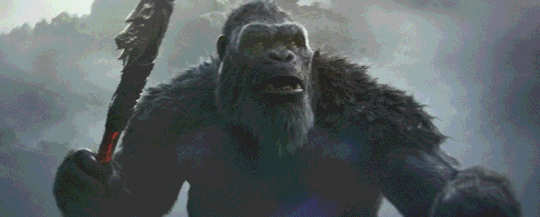
His journey with Suko (Diddy Kong) through the film is very heartfelt and is also reflected in Suko's own character development.

Meanwhile, Godzilla is trying to keep the peace on the surface world, bringing down kaiju that are wreaking havoc everywhere until plot relevant stuff happens and he's forced to get ready for Act III.
And Act III? Oh man, the final battle is SO MUCH FUN.
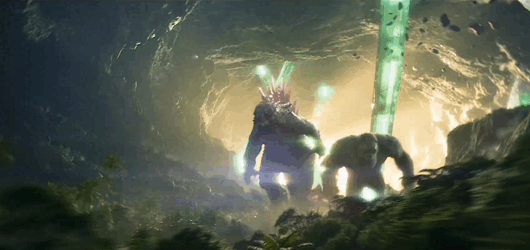
While I do miss the darker, grittier tones of Godzilla 2014 and KOTM, where the kaiju had immense weight and this way of feeling like forces of nature, I also love the direction that the Monsterverse is moving.
If possible, I'd love to see that darker, heavier weight of 2014 and KOTM matched with the narrative writing of Godzilla X Kong. It'd be great to have a more serious film that follows Godzilla or Kong, but I'm not opposed to continuing this Godzilla: Destroy All Monsters-type tone.
On a side note, I actually loved the soundtrack to this film. I wasn't a huge fan of Tom Hokenborg and Antonio Di Iorio's music in GvK, but now I adore the motifs used to represent Godzilla and Kong. I still stand that everything Bear McReary touches turns to gold, but he's a busy man and it cost Warner Bros a helluva lot of money to buy the rights to use Akira Ikufube's theme for KOTM. (While I love Godzilla Minus One, I really hate that Toho is super protective of their IPs and even more greedy with licensing them out.)
Bottom line: If they keep making content of this quality then I'm going to keep giving them my money.
NOW GIVE ME SPACEGODZILLA
5 notes
·
View notes
Text
Ass is parked at the first trial of Shadowbringers while I wait for a friend to catch up, which means its time to digest more thoughts!
Man, I am really liking this expansion so far.
I've talked about how much I'm digging the angelic eldritch horror shit, as well as obvious improvements to camera movement and visual storytelling, plus all the designs I'm digging, as well as music, but a thing I'm realizing now...
So, the sort of... genre/theme of each expansion is very different, and that's been really fun. Music for ARR is fine and fun, but mostly kinda forgettable except a few bosses, just sounds like game music to me. Stormblood naturally had a very eastern/adventure flair to it, I think my favorite being the Shinryu boss music which straight up felt like it was some Akira Ikufube kaiju movie shit, it was SO FUN. My favorite's been Heavensward for its big and bombastic religious dread with heavy pipe organ theming.
(Side not, but my favorite thing that I've ever noticed in this game was that all of the Allagan themes and each area's music of any Garlean Castrum is all very electronic. So when it came to Azys La, the Allagan facility invaded by Garleans in the Heavensward expansion, they gave it a heavy electric organ theme! I love letting things have their own musical identity like that and then combining and building off of them to musically convey an idea. I'm utterly useless at recognizing or appreciating music in any kind of trained way, so if even I notice things like that, that shows they put thought into it.)
My friend was telling me that for the most part, it's been Nobuo Uematsu who's been writing the main theme of each expansion, but as of Shadowbringers, he let someone else finally take over due to health reasons. Which is good, I love Uematsu as much as anyone else, he's incredible, but god, let the man retire. Gotta pass the torch at some point.
So, I will say, Shadowbringers has had a noticably distinct sound to it compared to the other expansions. It's a lot more... god, I'm bad at music words. Modern? Very rock/punk heavy, which I'm digging on its own merit, but also because it feels like it's trying to be a little rebellious, a little anti-establishment, which fits for the theme of becoming the "Warrior of Darkness." And considering that we're literally on another world, something this different compared to any other overworld music in the game is very fitting, actually. I'm really digging this.
7 notes
·
View notes
Text
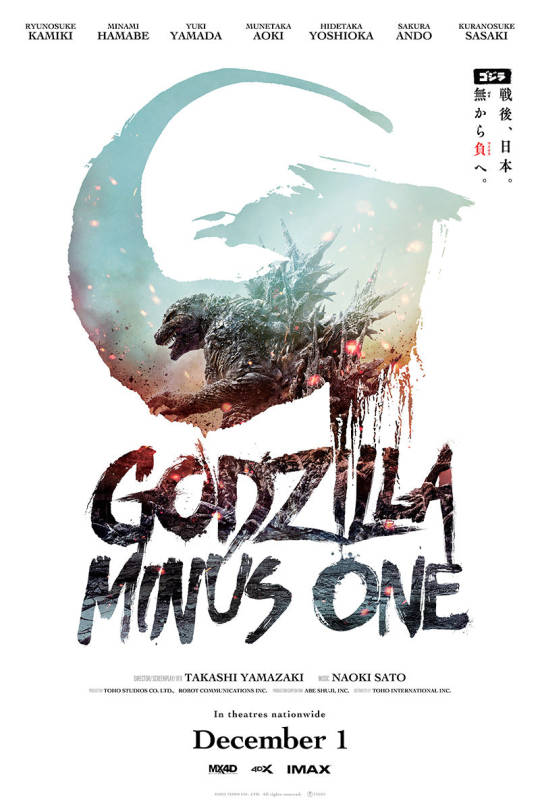
9/10: Absolutely captivating.
This is how one makes a Godzilla movie: a strong emotional core centered on a group of likeable characters, a sincere exploration of the human condition in the face of a seemingly implacable force, a tangible sense of dread and impending doom, and plenty of truly terrifying nuclear-powered Godzilla spectacle.
Reverential of the 1954 original's tone, updated with modern filmmaking, the film explores its heavy themes with utmost sincerity. While Shin Godzilla was more of a satirical criticism of the Japanese government's disaster response, Minus One is purely a character drama. Main protagonist Koichi Shikishima -a surviving kamikaze pilot dealing with survivor's guilt following an incident on Oda Island and his own shame at shirking his suicidal "duty" by faking a mechanical failure on his aircraft- makes for an empathetic lead. Much of the story deals with his post-war trauma, haunted by the deaths he feels responsible for. As he discovers reasons to live and fight, caring for a small orphaned baby with Noriko, a young woman he meets by happenstance, director Takashi Yamazaki is able to explore the ways the Japanese citizenry come together to rebuild, and ultimately cooperate to face the new monstrous threat. Despite his often dour and dejected behavior, Koichi remains likeable thanks to a script that gives him many interesting characters to interact with, such as his fun mine-sweeping boat crewmates. Dialogue can sometimes veer into corniness, but the cast makes it work.
While the subject matter is quite serious, this is still a Godzilla movie, so there are many scenes of characters discussing the creature and ways to fight it that sometimes feels at odds tonally with the post-war drama. Again, the cast makes the campier elements work by injecting enough sincerity and humor. The film feels balanced between its intimate moments between people, and its exciting action scenes.
Much has been said already of how good the movie looks despite its relatively low budget. Though it doesn't have the graphical fidelity of the biggest Hollywood productions, it still manages to put a lot of western blockbusters to shame through near flawless execution of its ambitious set-pieces. Godzilla hasn't looked this terrifying in years (unlike Shin Godzilla, this version has a perpetual expression of absolute malice). The atomic breath attack of this iteration somehow tops Shin's focused laser beam in terms of sheer destructiveness.
The score feels very modern, and works to increase the tension. When the iconic Akira Ikufube theme kicks in... chills guaranteed.
4 notes
·
View notes
Text
I'm getting emotional about the fact that the original Godzilla suite in the first movie was so beautiful and so perfect for the creature that in every subsequent movie it had to be reused. Truly a masterpiece, what an insane impact. And it's true that even without having watched it you hear the first few notes and know it's about a terrifying giant monster and it will make you think about the human condition. Fantastic work, Ikufube Akira.
0 notes
Video
youtube
Bear McCreary’s remix of the classic Akira Ikufube musical score for the upcoming 2019 film, Godzilla: King of the Monsters.
35 notes
·
View notes
Text
READY PLAYER ONE
It’s gonna take me a week using the “pause” button to identify every Easter egg in “Ready Player One” when it comes out on Blu Ray, but it’ll be worth it.
I loved the way the filmmakers gave us a King Kong with a face reminiscent of the original version. I wish subsequent appearances of Kong would do the same.
I also loved the great Mechagodzilla we got, an updated-but-absolutely-repectful version that I wish had gotten more screen time. I remember his appearance from reading the book, but wasn’t certain Toho would give permission for his use, until I realized Warner Bros had already made a deal with Toho for Godzilla and many of his allies/enemies. It was also great that composer Alan Silvestri was able to work in an Akira Ikufube theme during the Mechagodzilla battle.
Wanted an Ultraman appearance like there was in the book, but you can’t have everything.
1 note
·
View note
Note
Bat-Gran!! I didn't know you're a Godzilla fan!! I really love Godzilla too (I just really love giant monsters fighting other giant monsters and his design is so niiiice!!). If you've watched the movies, is it okay if I ask your opinion on the Godzilla 2014 and Godzilla: King of the Monsters (2019)? and if you're up for it, Godzilla (1998)?
Believe or not I got introduced to Godzilla when I was in college (back in the 70s). It was the original 1954 Japanese film that used Gojira as a metaphor for the atomic bomb. It was love at first sight.
Legendary’s 2014 Godzilla movie was more like the 1954 film than 2019′s Godzilla King of the Monsters. The first time we get to see Godzilla at the airport in Hawaii and the halo drop into San Francisco...
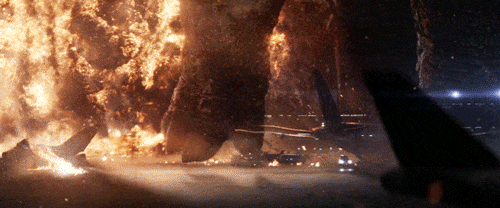
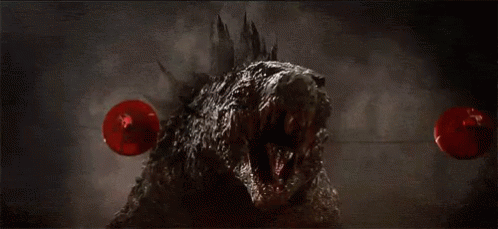
...are very reminiscent of1954 Gojira’s rampage through Tokyo.
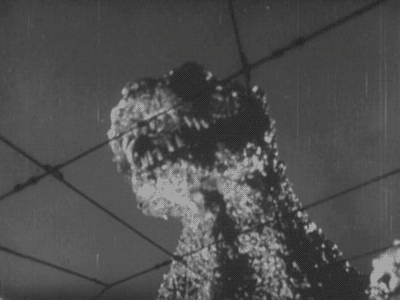
2019′s Godzilla King of the Monsters was more of an old fashioned kaiju flick. Don’t get me wrong, I like them both. Part of the reason I enjoyed the fight in Boston so much is that I know the area so well (grew up in Natick Massachusetts). The building my husband worked in for 25+ years before he retired was destroyed on camera. It was very cathartic.
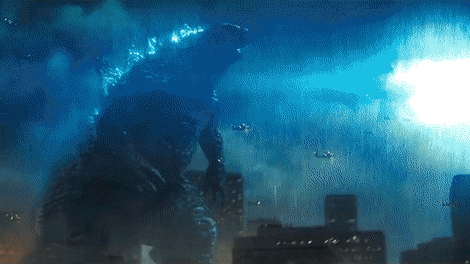
The two movies couldn’t have been more different but each are enjoyable for completely different reasons.
Oh, and I love the fact that they used Akira Ikufube’s origional music from the 1954 Japanese version was used in Godzilla King of the Monsters! That was a lovely homage.
Don’t get me started about the abomination that was Godzilla 1998.
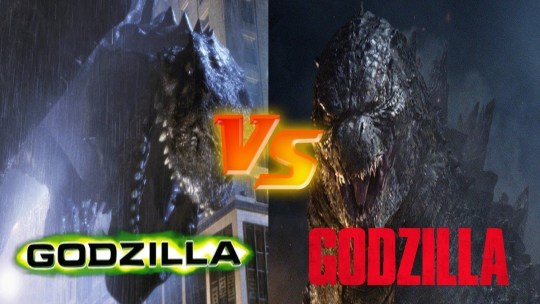
That was not Godzilla. It was a rip off of The Beast From 2000 Fathoms (which in itself was a rip off of a Ray Bradbury short story). I will admit that it was a kaiju flick since it had the requisite large monster and massive property damage (and the screaming crowds) but it was not my beloved Gojira.
Sorry you asked?
27 notes
·
View notes
Note
Best and worst licensed video game you've played?
Best - This is a toss up between TMNT IV: Turtles in Time and Batman: Arkham City I think i’m leaning Batman since it kinda has a Mario 64 effect. Batman is just so much fun to control, he feels good to move around as, so I can have fun playing the game even if i’m not accomplishing anything... granted, he has a higher learning curve than Mario... I also say City over Asylum because City let you stay airborne with some skillful cape maneuvers... I really feel like B
Though it should be noted, I haven’t played many licensed games all the way through, much less played them at all.
Worst one I ever played and i’ll only count games that I made a genuine effort to play and I didn’t shut it off after 2 minutes?
Super Godzilla. Navigating is clunky and confusing, then you get to the actual monster fights and the battle system is such nonsense, I don’t know how anyone is meant to pass the first Ghidora encoutner... I wanted to like it because I love Godzilla, and hearing a 16 bit version of the Akira Ikufube’s iconic Godzilla music as you stomp toward the enemy monster is really enticing, but god damn that game is a wreck.
5 notes
·
View notes
Text
WE HAVE SEEN EMPEROR OF THE BEASTS AND IT WAS REAL FUCKING GOOD. THOUGHTS BELOW:
Some criticisms:
- You could delete the whole family from the movie and have a better movie.
- Seriously the dad character and his family were the worst, and none of the other human characters were that much better, barring 1/2 of the Mothra twins and Dr. Serizawa himself.
- The dialogue is really that bad. I expect cheesy, corny dialogue, but some of the lines were bad with those standards.
- Not cool how you had a black woman commander literally not have control over her men because white dad has to tell everybody what to do for half the movie. At least she has a kickass scene piloting the Argo and being chased by Rodan and Ghidorah though.
- Dr. Serizawa using a nuke to wake Godzilla up was super weird. The american movies in general have a really flippant take on nuclear weapons considering Godzilla's THE anti-nuclear weapon symbol. The original Dr. Serizawa created the Oxygen Destroyer as a last resort and didn't want to use it, and its use only killed the original Godzilla but created or led to the creation of Destroyah and Kiryu while a new Godzilla emerged.
- Why did they bring the Mutos back they suck JUST GIVE US MORE TOHO KAIJU.
Specific cool stuff I want to point out
- I really love how they gave the monsters incredibly distinct personalities while remaining very faithful to their iconic designs and even giving them their original roars at certain key points in the movie. You can tell this was made with love.
- For that matter, I actually really like how they knew their audience? Like this movie easily could have fallen into the trap of following The Marvel Formula (tm) but stuck to its guns. A lot of people aren't going to like it, but to a fan of Showa-era Godzilla its the movie the 1960's-1970's Toho would have made with modern technology and a big budget. Even the stranger parts of the Godzilla canon such as aliens, Atlantis, and the Mothra priestess twins all made some form of appearances. There's a sincere earnestness to this movie that makes me feel as of the crew were just as big a fan of the source material as the people they're marketing this to.
- THE SHOTS IN THIS MOVIE. ART. KING GHIDORAH WAS TREATED LIKE A GOD.
- SO MANY SHOUTOUTS TO CLASSIC KAIJU. THEY ALSO CONFIRMED GAMERA'S EXISTENCE AND PEOPLE HAVE BEEN WAITING FOR GAMERA TO MEET GODZILLA FOR OVER 50 YEARS NOW IT CAN BE REAL.
- Akira Ikufube's original theme. I got chills. They played Mothra's original theme too! Incredible!!
- I love King Ghidorah's left head. He tries his best.
Some final thoughts:
- If anyone deserves to direct a Monsterverse movie, it's Guillermo Del Toro. He LOVES Godzilla like no one else and Pacific Rim being so good despite not relying on any Toho nostalgia whatsoever means he is the director I trust most to get these movies right.
- Oxygen Destroyer means we're getting Destroyah to appear as the final big bad in Kong vs Godzilla. You heard it here first.
- Please add Mechagodzilla in a movie they teased anyone and everyone but the second most iconic villain in the entire franchise please oh please
36 notes
·
View notes
Text
Monster Mania: Music From The Classic Godzilla Films (1954-1995)
'http://www.gravediggerslocal.com/wp-content/uploads/2017/03/monstermaniacddusted.png'
Randy Miller
Official Site
Monster Mania: Music From The Classic Godzilla Films (1954-1995), Varѐse Sarabande 1998
Up until 1998, American Godzilla fans who wanted to listen to the uninterrupted music from the films they love had very few options. Unless you were able to import albums directly from Japan, the selection was limited to Neil Norman & His Cosmic Orchestra’s decidedly bouncy covers of “Monster Zero March” and the classic Godzilla theme from the Greatest Science Fiction Hits series. One of the few good things about Tristar’s so-called Godzilla movie was the wave of products associated with the Japanese films which flooded the stores to cash in on the hype. One such release was Varѐse Sarabande’s Monster Mania: Music From The Classic Godzilla Films (1954-1995). It was originally promoted under the same “Godzilla Classic Themes From The Classic Films” and some CDs bearing that title seem to have been released, but apparently Toho made them change the name for some reason. But that isn’t the important part. You’re reading this to see how the new recordings compare to the original versions used in the movies!
The drum footfalls of “Godzilla-King Of The Monsters (Main Title)” are not quite the same as you hear in the film, but the power of the composition is still there. It’s highly enjoyable despite such small differences. The rousing and militaristic “Destroy All Monsters (March)” clearly shows off its musical influence from Akira Ifukube’s previous work. Not that it makes the music any less great. As you have probably guessed from the title, “Godzilla Vs. Mothra Suite (Main Title, The Letter, Song Of Mothra, Mothra March)” is a combination of several compositions in a single track. The main title portion devotes equal attention to Godzilla and Mothra. The musical sense of power represents Godzilla and the light fluttering notes are obviously supposed to represent Mothra. The soft piano work wonderfully compliments the sadness of “The Letter” portion of the track and despite it being an instrumental, I can practically hear the lyrics of the Mothra song. The chimes were also a nice touch. The last portion is a Ifukube military march with touch of his classic Godzilla theme. Taking a break from Ifukube, we move on to Reijiro Koroku’s “Godzilla 1984 (Main Title).” The opening cymbal crash and moody, low notes help the track’s overall melding of bombast and suspense. The drumrolls are a great touch as well. I also enjoyed the piano work of the pleasant “Godzilla 1984 (Love Theme).” As the original Japanese soundtrack for King Kong vs. Godzilla didn’t get released in America until 2006, the inclusion of “King Kong Vs. Godzilla (Godzilla Revived/King Kong Transport Operation)” was a real treat for G-fans back in 1998. As expected, they opted for the heavy material rather than the Lyman-esque jazz tracks. The second half of the track is one of my personal favorites. It has such a busy feel and splendid use of percussion and horns. The way Takayuki Hattori’s “Godzilla Vs. Space Godzilla (Main Title)” makes use of drums reminds me of something from the James Bond franchise. While we’re on the subject of that particular film, “Godzilla Vs. Space Godzilla (Love Theme)” offers the listener a quieter moment. I only wish it had been spaced out further from the other love theme on the album.
Masaru Sato’s “Godzilla Vs. The Sea Monster (The Departure From Retch Island)” brings us both the feel of south seas adventure and confusion for those who had seen the island’s name translated as either “Letchi” or “Retchi” over the years. Although it’s not quite the same as original, anyone who has seen the film could easily identify what movie it was from just by listening to it. Akira Ifukube returns with a vengeance for his final Godzilla outing with “Godzilla Vs. Destroyer (Main Title/Destroy Hong Kong)” and includes his trademark use of steady drums implying heavy footfalls while “Godzilla Vs. Destroyer (Requiem)” is appropriately soft and mournful. “Son Of Godzilla (Godzilla & Minilla)” is pretty darn close what’s heard in the actual film. It’s goofy and light, with just touch of menace that leads so nicely into the guiro-filled “Son Of Godzilla (Kamakilas).” Since I have already expressed my affection for the original, I’ll just say this is different enough to be distracting. Koichi Sugiyama’s “Godzilla Vs. Biollante (Main Title)” is both heavily inspired by Jaws and calls back to the opening theme for The Return of Godzilla. The soft and beautiful feel of “Godzilla Vs. Biollante (Biollante)” is presumably a reference to Biollante’s rose form. “Godzilla Vs. Biollante (Super X-2)” owes a LOT to John Williams’ Superman theme. The evocative piano and drums of “Godzilla Vs. King Ghidorah (Opening & Attack On The City)” are coupled with bassoon work to create some perfect Ifukube moodiness and “Godzilla Vs. King Ghidorah (Terasawa & Emmy/Goodbye, My Home Town)” offers plenty of sadness thanks to its expert use of flute and string work. The rousing “Godzilla Vs. Mechagodzilla (Main Title)” has plenty of callbacks to classic Godzilla material. Speaking of which, aspects of “Godzilla Vs. Mechagodzilla (G Force March)” should remind listeners of what they heard earlier in the album. Listening to “Godzilla (Requiem)” makes me appreciate “Godzilla Vs. Destroyer (Requiem)” so much more. Its occasional usage of chimes are a touch I had completely forgotten about. The drums and cymbals of “Godzilla-King Of The Monsters (Reprise)” come back for one more glorious time. After a lengthy wait, we get what seems to be another reprise…until the electric guitars kick in for a secret track! It’s a cover of Blue Öyster Cult’s “Godzilla” by Black. Its use of metal-style vocals is an interesting touch and it makes for a fun way to close things out.
Conductor Randy Miller and his orchestra have done a marvelous job covering a range of material that (more often then not) goes toe to toe with the originals. It’s all to easy to get lost in the overall spectacle when trying to focus on the music while watching the movies and listening to them like this allowed me to fully appreciate the music for what it was. I recall some reviewers complaining of being able to hear the musicians breathing but I’ve never noticed it. Although many soundtracks from Godzilla films have since been released in America, there are still plenty of reasons to track down a copy of this. Tracks 3, 5, 8, 9, 12-16 and 18 still have yet to be released in their original form in America and this album is the only way to experience what things might have been like if Akira Ifukube had recorded his work in stereo. Considering how Toho made an ultimately failed attempt to rework some original monaural recordings into stereo for the Shin Godzilla soundtrack, it looks like this album will remain the only way to do so for quite some time. It’s also an interesting time capsule of sorts. Note only are some of the translations “off,” but this came out at a time before Toho really put its foot down about the 1984 Godzilla being referred to as The Return of Godzilla and before the name Godzilla vs. Destoroyah was settled on. But in the case of the latter, the album does have the benefit of the film having not having been released in the States at the time. But I can’t complain too much seeing as how I opted to use Amazon’s version of the track names, which combine the title of the film with the title of the tracks themselves, rather than just use the track names from the back of the CD case. The liner notes offer a nice look at the history of the Godzilla franchise and the various musical influences and techniques present in the selected tracks. If you pay close attention to the album credits, you’ll even spot a credit to the band Black regarding their hidden contribution! It’s currently out of print but you can find it at a reasonable price if you look around. Hopefully Varѐse Sarabande will reissue it now that Legendary has boosted American interest in the Big G.
#Akira Ikufube#Godzilla#Kaiju#Koichi Sugiyama#Masaru Sato#Monster Mania: Music From The Classic Godzilla Films (1954-1995)#Music#Randy Miller#Reijiro Koroku#review#Takayuki Hattori
0 notes
Text
TOP 100 FILM SCORES: Part XXI (1900-99; ranked by year)
Complete. Thanks to everyone who has been following. Here is the complete list but feel free to look into the Archive or see earlier posts to see YouTube videos for each selection. 🌰💗🤓💗
1. The Matrix, 1999, Don Davis
2. The Red Violin, 1998, John Corigliano
3. Mononoke-hime [Princess Mononoke], 1997, Joe Hisaishi
4. Mousehunt, 1997, Alan Silvestri
5. Tomorrow Never Dies, 1997, David Arnold
6. Titanic, 1997, James Horner
7. Apollo 13, 1995, James Horner
8. The Usual Suspects, 1995, John Ottman
9. CutThroat Island, 1995, John Debney
10. The Lion King, 1994, Hans Zimmer
11. The Shawshank Redemption, 1994, Thomas Newman
12. Jurassic Park, 1993, John Williams
13. Rudy, 1993, Jerry Goldsmith
14. Schindler's List, 1993, John Williams
15. Beauty and the Beast, 1991, Alan Menken
16. Star Trek VI: The Undiscovered Country, 1991, Cliff Eidelman
17. The Russia House, 1990, Jerry Goldsmith
18. DuckTales the Movie: Treasure of the Lost Lamp, 1990, David Newman
19. Edward Scissorhands, 1990, Danny Elfman
20. Batman, 1989, Danny Elfman
21. Glory, 1989, James Horner
22. Who Framed Roger Rabbit, 1988, Alan Silvestri
23. The Land Before Time, 1988, James Horner
24. The Mission, 1986, Ennio Morricone
25. Back to the Future, 1985, Alan Silvestri
26. Brazil, 1985, Michael Kamen
27. Ran [War], 1985, Tôru Takemitsu
28. Out of Africa, 1985, John Barry
29. The Natural, 1984, Randy Newman
30. E.T. the Extra-Terrestrial , 1982, John Williams
31. Conan the Barbarian, 1982, Basil Poledouris
32. Poltergeist, 1982, Jerry Goldsmith
33. Raiders of the Lost Ark, 1981, John Williams
34. Body Heat, 1981, John Barry
35. The Empire Strikes Back, 1980, John Williams
36. Star Trek: The Motion Picture, 1979, Jerry Goldsmith
37. The Boys from Brazil, 1978, Jerry Goldsmith
38. Superman, 1978, John Williams
39. Star Wars, 1977, John Williams
40. Close Encounters of the Third Kind, 1977, John Williams
41. The Omen, 1976, Jerry Goldsmith
42. Jaws, 1975, John Williams
43. The Wind and the Lion, 1975, Jerry Goldsmith
44. Murder on the Orient Express, 1974, Richard Rodney Bennett
45. The Parallax View, 1974, Michael Small
46. The Godfather: Part II, 1974, Nino Rota, Carmine Coppola
47. La Planète Sauvage [Fantastic Planet], 1973, Alain Goraguer
48. Summer of '42, 1971, Michel Legrand
49. The Wild Bunch, 1969, Jerry Fielding
50. The Lion in Winter, 1968, John Barry
51. Bullitt, 1968, Lalo Schifrin
52. Planet of the Apes, 1968, Jerry Goldsmith
53. The Thomas Crown Affair, 1968, Michel Legrand
54. The Swimmer, 1968, Marvin Hamlisch
55. C'era una Volta il West [Once Upon a Time in the West], 1968, Ennio Morricone
56. Wait Until Dark, 1967, Henry Mancini
57. Cool Hand Luke, 1967, Lalo Schifrin
58. Il Buono, Il Brutto, Il Cattivo [The Good, the Bad and the Ugly], 1966, Ennio Morricone
59. Doctor Zhivago, 1965, Maurice Jarre
60. The Great Race, 1965, Henry Mancini
61. Goldfinger, 1964, John Barry
62. It's a Mad, Mad, Mad, Mad World, 1963, Ernest Gold
63. Jason and the Argonauts, 1963, Bernard Herrmann
64. The Great Escape, 1963, Elmer Bernstein
65. The Pink Panther, 1963, Henry Mancini
66. Lawrence of Arabia, 1962, Maurice Jarre
67. Mutiny on the Bounty, 1962, Bronislaw Kaper
68. To Kill a Mockingbird, 1962, Elmer Bernstein
69. Taras Bulba, 1962, Franz Waxman
70. El Cid, 1961, Miklós Rózsa
71. The Magnificent Seven, 1960, Elmer Bernstein
72. Psycho, 1960, Bernard Herrmann
73. Kyônetsu no Kisetsu [The Warped Ones], 1960, Toshirô Mayuzumi
74. Exodus, 1960, Ernest Gold
75. The Alamo, 1960, Dimitri Tiomkin
76. Ben-Hur, 1959, Miklós Rózsa
77. North by Northwest, 1959, Bernard Herrmann
78. Vertigo, 1958, Bernard Herrmann
79. The Big Country, 1958, Jerome Moross
80. Around the World in 80 Days, 1956, Victor Young
81. Shichinin no Samurai [The Seven Samurai], 1954, Fumio Hayasaka
82. The Robe, 1953, Alfred Newman
83. High Noon, 1952, Dimitri Tiomkin
84. A Streetcar Named Desire, 1951, Alex North
85. Sunset Boulevard, 1950, Franz Waxman
86. Samson and Delilah, 1949, Victor Young
87. The Treasure of the Sierra Madre, 1948, Max Steiner
88. The Ghost and Mrs. Muir, 1947, Bernard Herrmann
89. Spellbound, 1945, Miklós Rózsa
90. Double Indemnity, 1944, Miklós Rózsa
91. Laura, 1944, David Raksin
92. Casablanca, 1942, Max Steiner
93. Now Voyager, 1942, Max Steiner
94. Dumbo, 1941, Frank Churchill, Oliver Wallace
95. The Sea Hawk, 1940, Erich Wolfgang Korngold
96. Aleksandr Nevskiy, 1938, Sergei Prokofiev
97. The Adventures of Robin Hood, 1938, Erich Wolfgang Korngold
98. Snow White & the Seven Dwarfs, 1937, Frank Churchill, Leigh Harline, Paul J. Smith
99. King Kong, 1933, Max Steiner
100. Metropolis, 1927, Gottfried Huppertz
Honourable mentions:
The Cider House Rules, 1999, Rachel Portman
Pleasantville, 1998, Randy Newman
Thin Red Line, 1998, Hans Zimmer
DragonHeart, 1996, Randy Edelman
Crimson Tide, 1995, Hans Zimmer
The Fugitive, 1993, James Newton Howard
The Untouchables, 1987, Ennio Morricone
A Passage to India, 1984, Maurice Jarre
Once Upon a Time in America, 1984, Ennio Morricone
Star Trek II, 1982, James Horner
The French Lieutenant's Woman, 1981, Carl Davis
Days of Heaven, 1978, Ennio Morricone
Watership Down, 1978, Angela Morley
Godzilla, 1954, Akira Ikufube
The Devil and Daniel Webster, 1941, Bernard Herrmann
0 notes
Audio
Personally, one of my top favourite tracks from the franchise. Titled “The Enigmatic Old Man”, or “The Mysterious Old Man”, this track certainly captures the mythical and mystical nature of the film’s interestingly original take on Gojira and the other monsters. Composed by Ōtani Kō.
20 notes
·
View notes
Text
SON OF GODZILLA
There were many posters designed for 1967′s Son of Godzilla, each targeted to the country and/or market the film was being shown in.
Unfortunately, 1967 was also the height of the “camp” era, thanks to the widely popular Batman television series. That is the reason we have this silly international poster for Son of Godzilla.
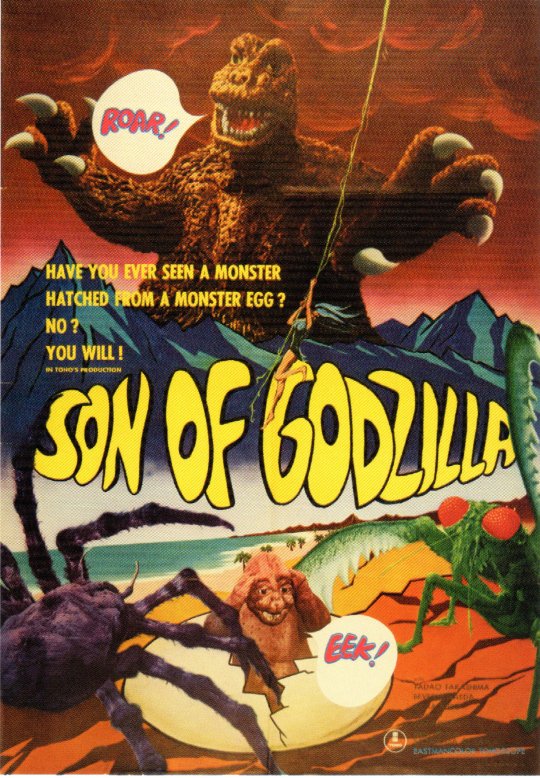
But wait! They also released an even sillier version of the poster:
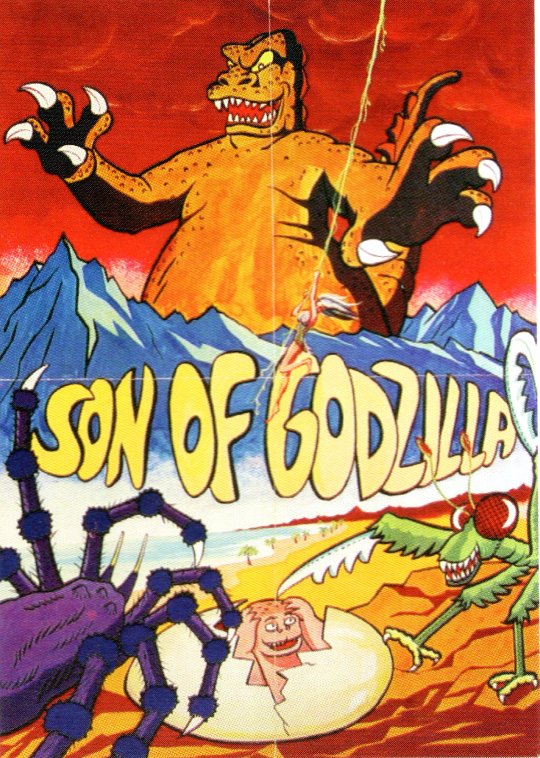
As if these weren’t bad enough, we also were presented the absolute worst Godzilla costume of the entire series.
The suit was made larger to emphasize the size difference between Godzilla and his devil-spawn Minilla. There is a theory that the eyes were placed on top of the head to make Godzilla look even taller (they just made him look goofier)!
In any event, the suit was too big for Haruo Nakajima, the actor who normally played Godzilla. A much larger actor, Seji Onaka, was hired to play the Big G. Unfortunately, Onaka-san broke his fingers during filming and had to be replaced by actor Hiroshi Sekita. Minilla was played by Marchan the Dwarf.
The film kept with the island setting as had the previous entry in the series, Godzilla vs the Sea Monster aka Ebirah, Horror of the Deep. The island set was easier to build and cheaper than the cityscapes Godzilla usually fought in, which kept with the lower budgets the two Godzilla films had received.
This was the second year in a row Toho had assigned the bigger budgets, and the A-list kaiju production talent (director Ishiro Honda, special effects maestro Eiji Tsuburaya, and composer Akira Ikufube) to other kaiju projects: War of the Gargantuas in 1966, and King Kong Escapes in 1967.
Son of Godzilla never received a theatrical release in the US. The film went straight to television where it was a mainstay during “monster week” movie marathons for years.
#Son of Godzilla#Godzilla#Minailla#Minya#Spiega#Kumonga#Gimantis#Kamacuras#Jungle Girl Saeko#silly movie posters
7 notes
·
View notes
Video
youtube
Yet another Kaiju vid to get back in the swing of things, this time as a sort of test for the motion editor and playing with the camera abit.
All rights to their respective owners.
2 notes
·
View notes